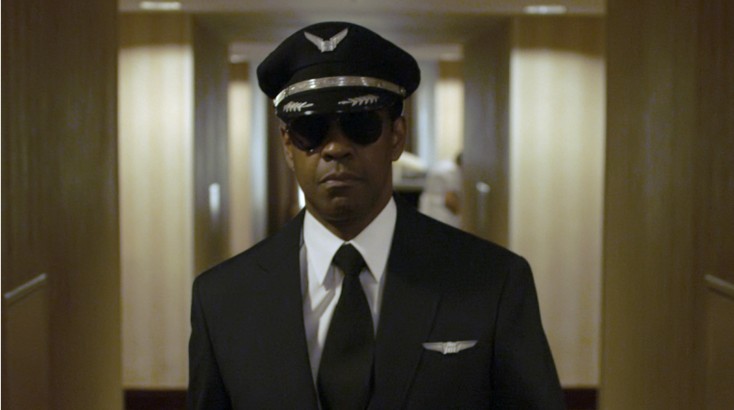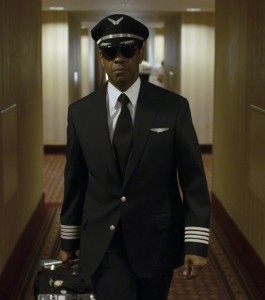By ANGELA DAWSON
Front Row Features
HOLLYWOOD—Oscar winner Denzel Washington has played a number of heroic characters over the years like anti-apartheid activist Steve Biko and poet Melvin Tolson to villainous character like dirty cop Alonzo Harris and notorious heroin dealer Frank Lucas, as well as a host of fallible antiheroes.
In “Flight,” the 57-year-old leading man plays an airline pilot who manages to land a jet, and save most of the passengers onboard, and is dubbed a hero. That is, until it is discovered it he had alcohol in his system during the flight, and may be responsible for the crash-landing and the resulting casualties.
The likable Washington recently spoke at a press conference about the drama that questions hero worship and working with director Robert Zemeckis.
Q: What made you want to play this character and what do you want the audience to take away from it?
Washington: I read the script and I just said, “Wow, this is good.” The last two scripts my agent, the late Ed Limato, gave me were “Flight” and “Safe House.” That was part of (my decision to do this movie)—just the promise I made to him. What do I want people to get from this movie? It depends upon what they bring to it. I don’t try to decide what people should get from it or why. I don’t do a part for those kinds of reasons.
Q: What was the best part of making this movie?
Washington: If you are on a movie and it’s like the third day, and you are going, “How many days have we been shooting? How many more do we have to go?” that’s a tough movie for me, but this was an adventure. I started with the screenplay and collaborating with the filmmaker and getting the chance to fly around in flight simulators, hanging upside down in the plane and playing a drunk. I wouldn’t say it was easy.
Q: Do you really think your character deserved prison time?
Washington: I believe he deserved more prison time. I actually mentioned this to Bob (Zemeckis), I actually thought the (sentence he got) was too low. I thought he should have gotten at least 20 years.
Q: Do you think there is that thing where being a celebrity, a movie star, anything else that it may be harder to deal with some of these things because people will lay out an escape path for you? Have you ever seen that in action?
Washington: Yes. Everybody (in the movie) is covering their own behinds is what it was‑the pilots, the airlines, so I don’t know if it was just so much they thought he was such a great hero as it was they needed him to be one in order to fulfill their agenda.
Q: In the hospital scene when the tears were rolling down your face, what state of mind were you in?
Washington: That question is kind of hard for me because I don’t analyze what I’m doing. I’m not sitting outside myself watching myself. (My character) was injured. He was disoriented. He was getting bits and pieces of what had happened to him. And I almost feel like the state of mind doesn’t set in until everybody’s gone, and the last person walks out. Everything else was just taking in information. What happened? Who’s gone? Whose fault? Did we get hit by another plane? Things like that. More practical.
Q: With all the movies that you’ve been in, is there ever a time where there are different lines in a movie or a scene that you wake up and think about?
Washington: I have the flying dream. I’ve had that for most of my life. And somehow I always end up near the city and I go underneath bridges. There are these low bridges that will either be over a train, like the Conrail with a train, or water, small body of water, and I’ll just work my way down and I stay under. Then I have the other part of the dream I would just take off forever, and I would (say), “Oh I have to stay below the street wire,” and I start to go back up. But then I’ve got to get back below the wires. I don’t know what it means.
Q: You’ve played many lost characters throughout your character. Could you talk a bit about playing Malcolm X, because it is the 20th anniversary of the release of that film next month? What are some of your fondest memories playing that character?
Washington: Twenty years? You know the first time I landed in Africa was 1986. I was doing “Cry Freedom.” The first time I landed in Egypt was for “Malcolm X,” and I think it was in ‘91 or ‘92. It was just a powerful feeling, and being able to move around with the people. I never felt threatened or anything like that.
Q: This film is so unique and so different from everything else that’s out and popular right now, so what set this apart from other scripts you’ve read?
Washington: If it ain’t on the page, it ain’t on the stage. When I read this—I felt like I read it in 14 minutes—I turned the pages so fast, I couldn’t wait to see what’s going to happen. This was one of those scripts where I knew it had to happen. I had to be a part of it. It was a process for us once I got involved and working with different people. But it was on the page, the guts, the pain (and) the tears. It’s like a Eugene O’Neill play. The tears were on the page.





